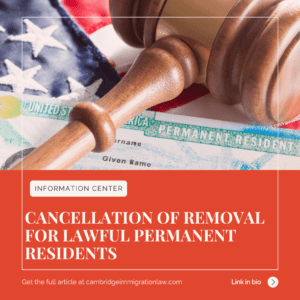CANCELLATION OF REMOVAL FOR LAWFUL PERMANENT RESIDENTS
 CANCELLATION OF REMOVAL FOR LAWFUL PERMANENT RESIDENTS
CANCELLATION OF REMOVAL FOR LAWFUL PERMANENT RESIDENTS
Facing removal proceedings as a lawful permanent resident (LPR) due to a criminal conviction can be an overwhelming experience. However, understanding your eligibility for cancellation of removal offers a potential solution to retain your green card and remain in the United States. In this comprehensive guide, we’ll delve into the intricacies of cancellation of removal for LPRs, outlining the application process, evidence requirements, and factors influencing the immigration judge’s decision.
Initiating the application process for cancellation of removal requires completing and filing Form EOIR-42A, also known as the Application for Cancellation of Removal and Adjustment of Status for Certain Nonpermanent Residents. This form serves as the foundation of your case and requests detailed information about your background, residency history, and familial ties in the United States. While completing the form, it’s essential to provide accurate and thorough responses to ensure your eligibility is properly evaluated by the immigration judge.
Proving eligibility for cancellation of removal entails gathering extensive evidence to support your case. This includes demonstrating that you have been a lawful permanent resident for at least five years and have maintained continuous residence in the United States for seven years prior to the initiation of removal proceedings. To substantiate these claims, you’ll need to compile a comprehensive portfolio of documents, such as copies of your green card, tax transcripts, lease agreements, utility bills, and employment records. Additionally, affidavits from family members, friends, and community members attesting to your character and contributions can strengthen your case.
The immigration judge presiding over your cancellation of removal hearing will weigh various factors to determine whether you merit relief. Adverse factors, such as the nature of your criminal conviction, immigration violations, and previous encounters with law enforcement, will be considered alongside humanitarian factors. These may include family ties in the United States, the impact of deportation on you and your loved ones, community involvement, employment history, and evidence of rehabilitation. Presenting a compelling narrative that highlights your positive contributions to society and demonstrates your commitment to reform can significantly influence the judge’s decision in your favor.
Navigating the complexities of cancellation of removal proceedings requires skilled legal representation. An experienced immigration attorney can provide invaluable guidance throughout the process, helping you gather evidence, prepare your case, and present compelling arguments before the immigration judge. By partnering with a knowledgeable advocate, you can navigate this challenging process with confidence and increase your chances of success in retaining your lawful permanent residency.

 CANCELLATION OF REMOVAL FOR LAWFUL PERMANENT RESIDENTS
CANCELLATION OF REMOVAL FOR LAWFUL PERMANENT RESIDENTS
Comments are closed.